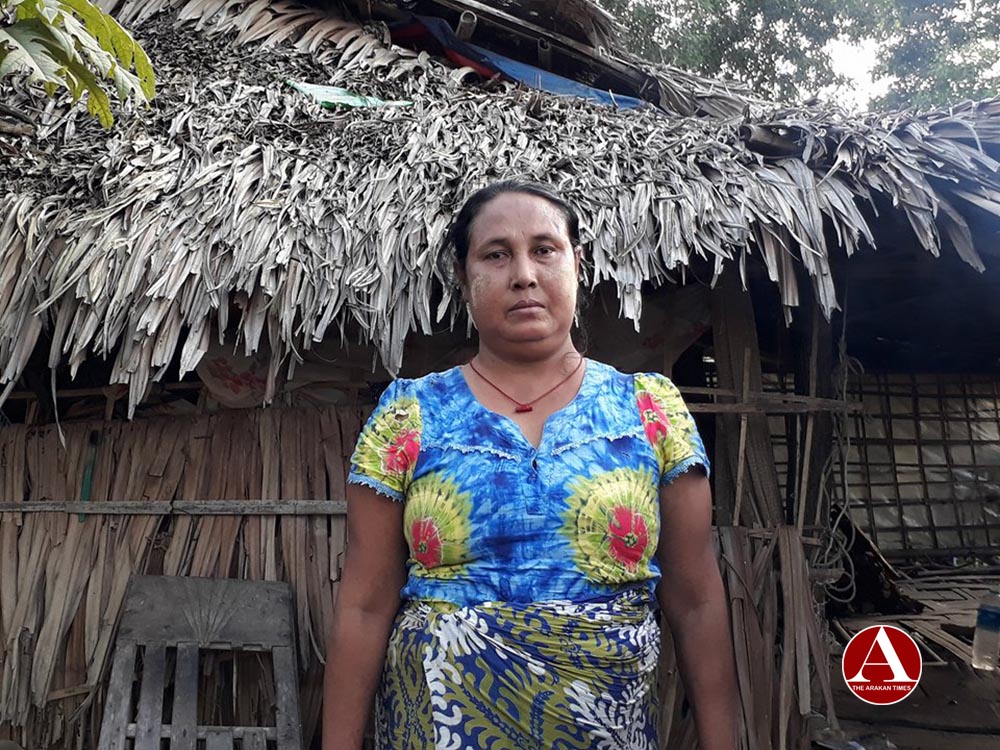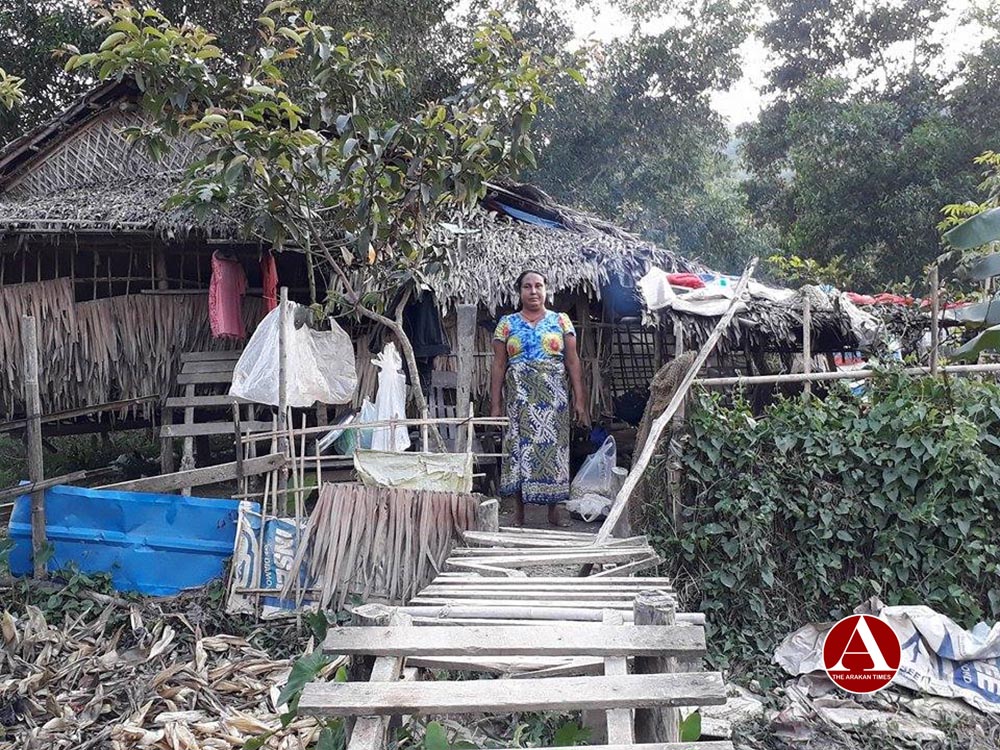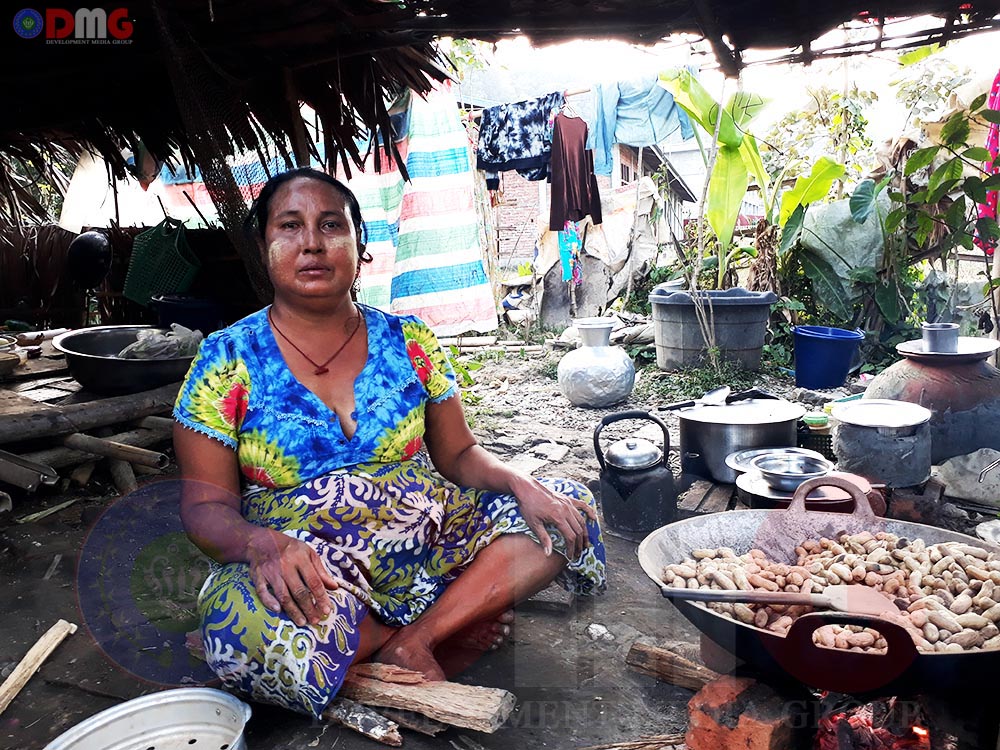- Indigenous communities in Chittagong Hill Tracts struggle amid ARSA threats
- Weekly Highlights from Arakan (Feb 16 to 22, 2026)
- Hindus struggle with livelihood hardships amid job shortages in Arakan State
- Equipment from Chinese-owned VPower plant in Kyaukphyu to be fully relocated amid growing conflict
- Free schools for IDP children in Arakan State struggle to stay open amid funding shortfall
Ma Phyu’s Story: Living Life in Limbo
She had four children with her Bengali husband. Again things turned for the worse for Ma Phyu when her husband took a second wife. With the arrival of the second wife, she said, her husband began treating her differently. “My husband was very good to me at the beginning. But then he brought home another wife when we already had four children. I didn’t want to live with him anymore. I also thought a lot about re-converting to Buddhism but I was really scared to do so because I was alone in the village.”
18 Aug 2018

Written By Pan Hla Aung/The Arakan Times
This is the story of how a Rakhine woman who was converted to Islam from birth and later reconverted to Buddhism lives her life navigating a dramatic series of events and life experiences, which include but aren’t limited to the 2012 communal violence in Rakhine State.
Now 47 years of age, Ma Phyu has lived most of her life believing she was a Bengali Muslim. She was born to Buddhist parents in Pan Zin Maw Village, Minbya Township. However, the very next day her biological parents left her for adoption with a Bengali couple named Allah Myah and Kulman from nearby village Sin Gyi Pyin (a Bengali village), which is how she was converted to Islam almost from birth.
Her long-held belief shattered on the day she got married. “I was married off when I was 14. I didn’t know a thing; I didn’t even know how to keep the longyis and saris in place. I found out that I was a Buddhist only when Judge U Pho Nyo and my adopted father told me so.” In the face of a deep-rooted Bengali religio-cultural environment in which not many people would accept that women and girls have the right to choose their marriage partner, if and when they want to marry, she was forced to begin her married life as a child.
She had four children with her Bengali husband. Again things turned for the worse for Ma Phyu when her husband took a second wife. With the arrival of the second wife, she said, her husband began treating her differently. “My husband was very good to me at the beginning. But then he brought home another wife when we already had four children. I didn’t want to live with him anymore. I also thought a lot about re-converting to Buddhism but I was really scared to do so because I was alone in the village.”
As her husband turned his attention to the second wife, Ma Phyu devoted hers to making a living for herself and her four children. All this made her think more and more about re-converting to Buddhism. Then came the 2012 communal violence, which dramatically changed her life, and broke her heart too. The conflict aggravated, and finally broke the relationship between Rakhine and Bengali communities. People from her own village, with whom she had lived for more than 40 years, turned against her and she became an enemy overnight. People from the two communities began looking at one another with suspicion and what was peaceful interaction became fraught with tension. Bengali communities turned into no-go zones for members of the Rakhine communities and vice versa. Ethnicity and religion became rigid boundaries of belonging which members of neither community could cross.
Communal violence that broke out in June 2012 drew a permanent dividing line for Ma Phyu’s family of six; her husband, son and oldest daughter remained with the Bengali side and the other two daughters and she crossed over to the Rakhine side and reconverted to Buddhism.
Leading up to leaving the Bengali Muslims, and embracing Buddhism again
As she attended to the cows in the neighbourhood, Bengalis’ suspicion of her grew, believing that she was working as informer for Rakhines. Things came to a head when the Bengali villagers destroyed her house and raped one of her daughters. “One evening when I came back home, the Bengalis came to destroy my house, calling me traitor. They took away all our possessions and raped my daughter. The next day they dragged me out of my house and left me naked, tied to a bush of shrubs in the tributary near the mosque. I think they left me to die of drowning when the tide came in. I was found by a military unit on patrol, and narrowly escaped death. Had they found me one hour too late, I would have died of drowning.” She was preparing food at the front of her shack in Kantkaw Myaing Ward, Minbya, where she had moved, as she recounted her ordeal to DMG.
Ma Phyu said “the reason why I was denounced as a traitor has to do with a theft case involving Bengalis from Sin Gyi Pyin Village (Bengali village) stealing two buffalos from Pan Zin Maw Village (Rakhine village). There was nothing she could do about Bengalis seeing her as Rakhine despite the fact that she had lived among Bengalis for more than 40 years and remained married to a Muslim man with four children. The current yar eain hmuu (village administrator in charge of 100 households) from Ma Phyu’s former village had the following to say about her:
“Ma Phyu and her family had lived in the village for more than 40 years. One of her sons is in Malaysia and one of her daughters got married and settled in Nagayar (Bengali village), Minbya. There wasn’t any problem. She left the village because of what happened to her daughter. I wasn’t a village administrative officer back then. U Ba Maung was in charge.”
She took the case of her 14 year old daughter, who was abducted at knifepoint and gang raped by 5 Bengali villagers, to the local security unit. The case was settled with a payment of 200,000 kyats ($150 US Dollar). It was irresponsible of those to have settled such a rape case through payment of 200,000 kyats, making justice a farce. “The Bengali villagers were mad at me for bringing the case to the attention of local authority. They called me “Rakhine bitch” and “traitor” and even threatened to kill my entire family. We got really scared, so we left the village and went into hiding in a betel leaf field at the foot of Kyane Mountain. We converted to Buddhism with help from Sin Gyi Pyin Vallage elders”, Ma Phyu recounts her story in Rakhine marked by a heavy Bengali accent.
Sin Gyi Pyin Village, where Ma Phyu grew up and lived most of her life, lies to the west of the Kyane hills in Minbya with a Bengali population of about 2000. In the vicinity are Rakhine side of Sin Gyi Pyin Village, Pan Zin Maw Village and other Rakhine villages. Although her two daughters and she had converted from Islam to Buddhism, they are not entirely welcomed by the Rakhine community either. Some Rakhines, including her daughter’s ex-lover who was a soldier, discriminate against them due to their “Bengali” background.

“People in Minbya town aren’t aware that she’s Rakhine although those from near her former village know it. She moved to Rakhine side after communal violence erupted and they converted to Buddhism. However, some Rakhines don’t like her for being “kalar” just as the Bengalis didn’t trust her for being “Rakhine”. It’s the same with her daughter. A solder from Battalion 379 almost married the poor girl before he found out about her background and abandoned her”, said Mar Mar Kyaw Zaw, director of Rakkha Alin Tan, a Minbya-based civil society organization.
Ma Phyu’s daughter Phyu Phyu was badly beaten up by two Rakhine women and three Rakhine men when she went to see Rakhine State Day celebrations in 2017 in Myo Ma Stadium, Minbya because she was mistaken for a Bengali woman. She had to be taken for treatment in Minbya and Sittwe hospitals. Legal proceedings for this unfortunate episode are still pending in Minbya Township Court. Although Ma Phyu is anxious to re-establish contact with her other two children who remained as Muslims, she is worried that it could draw disapproval from the Rakhine community. Now she is trying to scrape together a meagre income by repairing fishing nets and working as a vendor selling foodstuff in Minbya. However, she would not ask for remittance from her son in Malaysia because, as she said, they no longer live the same life. “My son offered to send money from Malaysia, but I don’t want to accept it because we now have completely different lives”. As she said this, tears welled up in Ma Phyu’s eyes, which she tried to wipe off with the back of her hands.
In short, Ma Phyu and her daughters are living a life in limbo. Having been driven out and violently persecuted by the Bengali community, they came to live among Rakhines only to find that they are not entirely accepted by the latter either.








.jpg)












